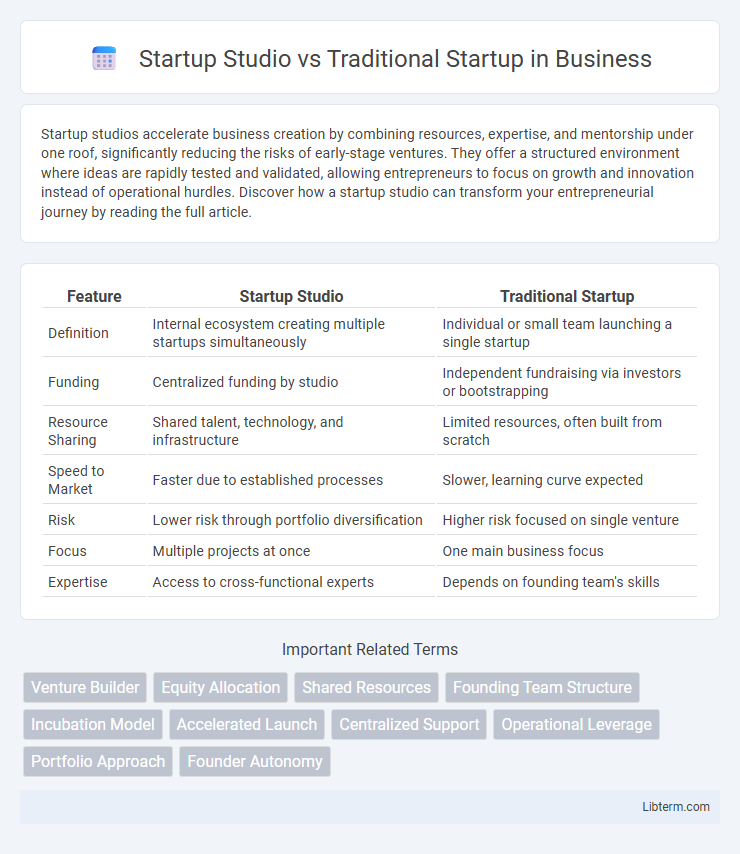Startup studios accelerate business creation by combining resources, expertise, and mentorship under one roof, significantly reducing the risks of early-stage ventures. They offer a structured environment where ideas are rapidly tested and validated, allowing entrepreneurs to focus on growth and innovation instead of operational hurdles. Discover how a startup studio can transform your entrepreneurial journey by reading the full article.
Table of Comparison
| Feature | Startup Studio | Traditional Startup |
|---|---|---|
| Definition | Internal ecosystem creating multiple startups simultaneously | Individual or small team launching a single startup |
| Funding | Centralized funding by studio | Independent fundraising via investors or bootstrapping |
| Resource Sharing | Shared talent, technology, and infrastructure | Limited resources, often built from scratch |
| Speed to Market | Faster due to established processes | Slower, learning curve expected |
| Risk | Lower risk through portfolio diversification | Higher risk focused on single venture |
| Focus | Multiple projects at once | One main business focus |
| Expertise | Access to cross-functional experts | Depends on founding team's skills |
Introduction to Startup Studios and Traditional Startups
Startup studios, also known as venture builders, systematically create and launch multiple startups by providing shared resources, mentorship, and operational support from inception. Traditional startups typically begin with a single founding team pursuing one unique idea, relying heavily on external funding and limited internal resources. The startup studio model accelerates innovation cycles and reduces risk by continuously iterating across various projects within a structured ecosystem.
Business Model Overview: Startup Studio vs Traditional Startup
Startup studios operate by systematically building multiple startups using shared resources, expert teams, and proven processes, enabling faster market entry and reduced risk compared to traditional startups. Traditional startups typically rely on a single founding team developing one business idea, often facing higher capital demand and extended timeframes for product-market fit. The startup studio model emphasizes scalability and efficiency through iterative idea validation and resource pooling, contrasting with the traditional startup's solitary innovation and fundraising challenges.
Funding and Resource Allocation
Startup studios centralize funding and resource allocation by pooling capital and talent across multiple ventures, enabling rapid iteration and risk diversification. Traditional startups rely heavily on individual fundraising rounds and often face limited access to shared resources, leading to higher operational costs and slower scalability. This centralized model in startup studios enhances capital efficiency and accelerates development cycles compared to the fragmented approach of traditional startups.
Team Composition and Talent Acquisition
Startup studios typically assemble multidisciplinary teams consisting of entrepreneurs, designers, developers, and marketers who collaborate on multiple ventures simultaneously, enhancing resource efficiency and expertise sharing. Traditional startups often rely on founding teams with specialized roles and recruit talent progressively based on immediate needs, which can limit early-stage scalability and agility. Talent acquisition in startup studios benefits from centralized networks and pooled resources, accelerating hiring and skill diversification compared to the ad hoc recruitment methods used by traditional startups.
Idea Generation and Validation Process
Startup studios centralize idea generation by employing dedicated teams to rapidly create and test multiple concepts simultaneously, drastically reducing time-to-market. Traditional startups often rely on founders' individual creativity and market research to generate ideas, which can lead to slower validation and higher risk. The studio model uses systematic validation methods such as MVPs and data-driven feedback loops to refine ideas swiftly, whereas traditional startups may take longer to pivot due to limited resources and iterative testing constraints.
Speed to Market and Scalability
Startup studios accelerate speed to market by providing pre-built infrastructure, experienced teams, and validated business models, enabling rapid prototyping and quick deployment compared to traditional startups that often face longer setup and development phases. Scalability in startup studios benefits from shared resources and standardized processes that support multiple ventures simultaneously, while traditional startups typically require dedicated investments and time-consuming scaling efforts. This structure allows startup studios to systematically test and scale ideas with reduced risk and higher efficiency, outperforming the scalability pace of conventional startups.
Risk Mitigation Strategies
Startup studios implement risk mitigation strategies by leveraging shared resources, expert teams, and validated market research to reduce the likelihood of early-stage failure. Traditional startups often face higher risks due to limited access to capital, expertise, and iterative testing, relying heavily on founder experience and external funding rounds. The structured environment within startup studios enables rapid pivoting and continuous validation, significantly lowering financial and operational risks compared to traditional startup models.
Support Systems and Mentorship
Startup studios offer integrated support systems including shared resources, expert mentorship, and operational assistance, ensuring startups have access to experienced professionals and infrastructure from inception. Traditional startups often face challenges securing consistent mentorship and may rely on external networks or accelerators for guidance, leading to variable support quality. The structured ecosystem of startup studios accelerates growth by providing continuous strategic input, while traditional startups must independently navigate mentorship and resource acquisition.
Success Rates and Examples
Startup studios demonstrate higher success rates compared to traditional startups, with some studies indicating up to 30% greater likelihood of sustained growth due to shared resources and experienced mentorship. Examples such as Rocket Internet and Betaworks highlight how startup studios systematically validate ideas and scale multiple ventures simultaneously, reducing risk and accelerating market entry. Traditional startups like Airbnb or Uber often rely on organic growth and individual founders' vision, which can result in slower scalability and higher failure rates.
Choosing the Right Approach for Your Entrepreneurial Journey
Startup studios offer a structured environment with shared resources, mentorship, and a portfolio approach to launching multiple startups simultaneously, enhancing efficiency and reducing individual risk. Traditional startups rely heavily on the founder's vision, direct funding, and team-building from scratch, allowing for greater autonomy and tailored innovation. Choosing the right approach depends on factors like risk tolerance, available resources, desired control, and the speed of market entry.
Startup Studio Infographic

 libterm.com
libterm.com